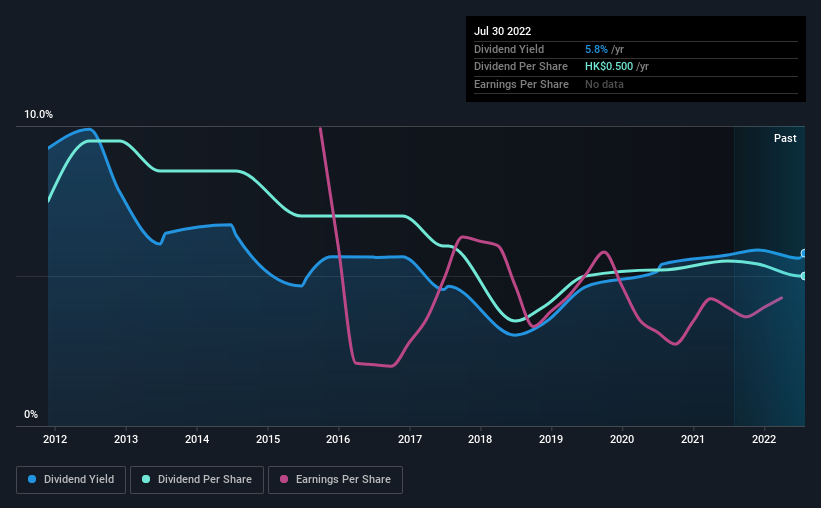- Hong Kong
- /
- Industrials
- /
- SEHK:25
Chevalier International Holdings (HKG:25) Is Paying Out Less In Dividends Than Last Year

Chevalier International Holdings Limited (HKG:25) has announced that on 23rd of September, it will be paying a dividend ofHK$0.35, which a reduction from last year's comparable dividend. This means that the annual payment will be 5.8% of the current stock price, which is in line with the average for the industry.
Check out our latest analysis for Chevalier International Holdings
Chevalier International Holdings' Earnings Easily Cover The Distributions
We aren't too impressed by dividend yields unless they can be sustained over time. Based on the last payment, Chevalier International Holdings was paying only paying out a fraction of earnings, but the payment was a massive 406% of cash flows. The business might be trying to strike a balance between returning cash to shareholders and reinvesting back into the business, but this high of a payout ratio could definitely force the dividend to be cut if the company runs into a bit of a tough spot.
Over the next year, EPS could expand by 3.6% if recent trends continue. If the dividend continues along recent trends, we estimate the payout ratio will be 22%, which is in the range that makes us comfortable with the sustainability of the dividend.

Dividend Volatility
The company's dividend history has been marked by instability, with at least one cut in the last 10 years. Since 2012, the dividend has gone from HK$0.75 total annually to HK$0.50. The dividend has shrunk at around 4.0% a year during that period. Declining dividends isn't generally what we look for as they can indicate that the company is running into some challenges.
The Dividend's Growth Prospects Are Limited
With a relatively unstable dividend, it's even more important to evaluate if earnings per share is growing, which could point to a growing dividend in the future. Earnings per share has been crawling upwards at 3.6% per year. Earnings growth is slow, but on the plus side, the dividend payout ratio is low and dividends could grow faster than earnings, if the company decides to increase its payout ratio.
In Summary
Overall, the dividend looks like it may have been a bit high, which explains why it has now been cut. While the low payout ratio is redeeming feature, this is offset by the minimal cash to cover the payments. Overall, we don't think this company has the makings of a good income stock.
Market movements attest to how highly valued a consistent dividend policy is compared to one which is more unpredictable. At the same time, there are other factors our readers should be conscious of before pouring capital into a stock. Just as an example, we've come across 3 warning signs for Chevalier International Holdings you should be aware of, and 1 of them is significant. Is Chevalier International Holdings not quite the opportunity you were looking for? Why not check out our selection of top dividend stocks.
New: AI Stock Screener & Alerts
Our new AI Stock Screener scans the market every day to uncover opportunities.
• Dividend Powerhouses (3%+ Yield)
• Undervalued Small Caps with Insider Buying
• High growth Tech and AI Companies
Or build your own from over 50 metrics.
Have feedback on this article? Concerned about the content? Get in touch with us directly. Alternatively, email editorial-team (at) simplywallst.com.
This article by Simply Wall St is general in nature. We provide commentary based on historical data and analyst forecasts only using an unbiased methodology and our articles are not intended to be financial advice. It does not constitute a recommendation to buy or sell any stock, and does not take account of your objectives, or your financial situation. We aim to bring you long-term focused analysis driven by fundamental data. Note that our analysis may not factor in the latest price-sensitive company announcements or qualitative material. Simply Wall St has no position in any stocks mentioned.
About SEHK:25
Chevalier International Holdings
Engages in the construction and engineering, property investment and development, healthcare investment, car dealership, and other businesses.
Mediocre balance sheet and slightly overvalued.
Market Insights
Community Narratives




